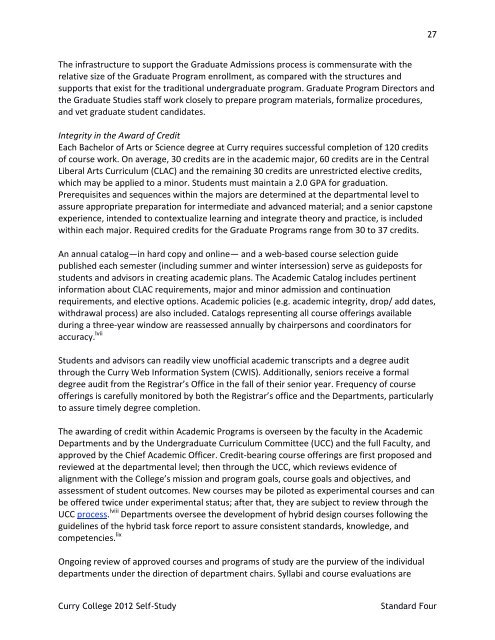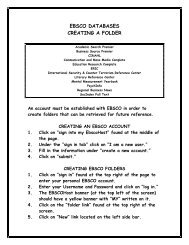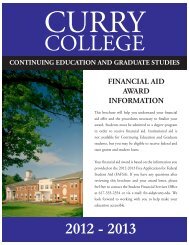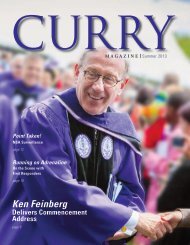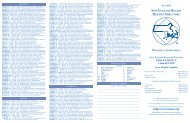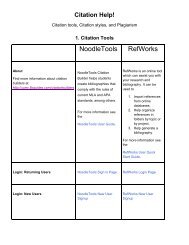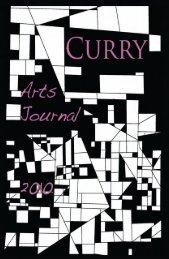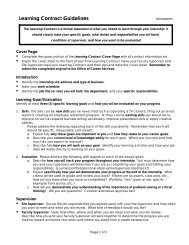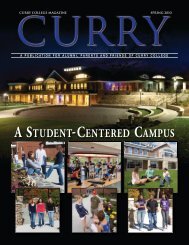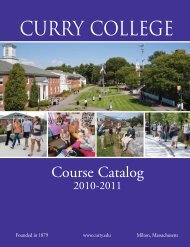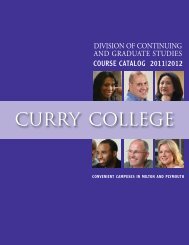Read the Curry College NEASC 2012 Self-Study Report.
Read the Curry College NEASC 2012 Self-Study Report.
Read the Curry College NEASC 2012 Self-Study Report.
You also want an ePaper? Increase the reach of your titles
YUMPU automatically turns print PDFs into web optimized ePapers that Google loves.
27<br />
The infrastructure to support <strong>the</strong> Graduate Admissions process is commensurate with <strong>the</strong><br />
relative size of <strong>the</strong> Graduate Program enrollment, as compared with <strong>the</strong> structures and<br />
supports that exist for <strong>the</strong> traditional undergraduate program. Graduate Program Directors and<br />
<strong>the</strong> Graduate Studies staff work closely to prepare program materials, formalize procedures,<br />
and vet graduate student candidates.<br />
Integrity in <strong>the</strong> Award of Credit<br />
Each Bachelor of Arts or Science degree at <strong>Curry</strong> requires successful completion of 120 credits<br />
of course work. On average, 30 credits are in <strong>the</strong> academic major, 60 credits are in <strong>the</strong> Central<br />
Liberal Arts Curriculum (CLAC) and <strong>the</strong> remaining 30 credits are unrestricted elective credits,<br />
which may be applied to a minor. Students must maintain a 2.0 GPA for graduation.<br />
Prerequisites and sequences within <strong>the</strong> majors are determined at <strong>the</strong> departmental level to<br />
assure appropriate preparation for intermediate and advanced material; and a senior capstone<br />
experience, intended to contextualize learning and integrate <strong>the</strong>ory and practice, is included<br />
within each major. Required credits for <strong>the</strong> Graduate Programs range from 30 to 37 credits.<br />
An annual catalog—in hard copy and online— and a web‐based course selection guide<br />
published each semester (including summer and winter intersession) serve as guideposts for<br />
students and advisors in creating academic plans. The Academic Catalog includes pertinent<br />
information about CLAC requirements, major and minor admission and continuation<br />
requirements, and elective options. Academic policies (e.g. academic integrity, drop/ add dates,<br />
withdrawal process) are also included. Catalogs representing all course offerings available<br />
during a three‐year window are reassessed annually by chairpersons and coordinators for<br />
accuracy. lvii<br />
Students and advisors can readily view unofficial academic transcripts and a degree audit<br />
through <strong>the</strong> <strong>Curry</strong> Web Information System (CWIS). Additionally, seniors receive a formal<br />
degree audit from <strong>the</strong> Registrar’s Office in <strong>the</strong> fall of <strong>the</strong>ir senior year. Frequency of course<br />
offerings is carefully monitored by both <strong>the</strong> Registrar’s office and <strong>the</strong> Departments, particularly<br />
to assure timely degree completion.<br />
The awarding of credit within Academic Programs is overseen by <strong>the</strong> faculty in <strong>the</strong> Academic<br />
Departments and by <strong>the</strong> Undergraduate Curriculum Committee (UCC) and <strong>the</strong> full Faculty, and<br />
approved by <strong>the</strong> Chief Academic Officer. Credit‐bearing course offerings are first proposed and<br />
reviewed at <strong>the</strong> departmental level; <strong>the</strong>n through <strong>the</strong> UCC, which reviews evidence of<br />
alignment with <strong>the</strong> <strong>College</strong>’s mission and program goals, course goals and objectives, and<br />
assessment of student outcomes. New courses may be piloted as experimental courses and can<br />
be offered twice under experimental status; after that, <strong>the</strong>y are subject to review through <strong>the</strong><br />
UCC process. lviii Departments oversee <strong>the</strong> development of hybrid design courses following <strong>the</strong><br />
guidelines of <strong>the</strong> hybrid task force report to assure consistent standards, knowledge, and<br />
competencies. lix<br />
Ongoing review of approved courses and programs of study are <strong>the</strong> purview of <strong>the</strong> individual<br />
departments under <strong>the</strong> direction of department chairs. Syllabi and course evaluations are<br />
<strong>Curry</strong> <strong>College</strong> <strong>2012</strong> <strong>Self</strong>-<strong>Study</strong><br />
Standard Four


